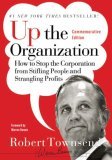Originally
published on Monday, June 18, 2007 in The Miami Herald
Maverick's advice still resonates decades later.
A new edition of an influential business book written 40 years ago reinforces the value of the advice given by ex-Avis CEO Robert Townsend.
BY RICHARD PACHTER
rapATwordsonwords.com
Up the Organization: How to Stop the Corporation from Stifling People and Strangling Profits (Commemorative Edition). Robert L. Townsend. Wiley. 260 pages.
 It's hardly revolutionary these days for some consultant, CEO or other rapscallion to declare that the structure of business institutions is in and of itself a problem. In order to succeed, they declare, one must be an individual, not a corporate drone, and approach each situation from a common-sense perspective.
It's hardly revolutionary these days for some consultant, CEO or other rapscallion to declare that the structure of business institutions is in and of itself a problem. In order to succeed, they declare, one must be an individual, not a corporate drone, and approach each situation from a common-sense perspective.
Forty years ago, an excerpt of ex-Avis CEO Robert Townsend's new book appeared in Harper's magazine and, according to the publisher, ''a half dozen desperate people appeared at the Knopf reception desk looking for the book.'' It became an immediate bestseller, and Townsend was a frequent guest on the TV talk shows of the day -- though he was banned from The Tonight Show after he hit a nerve in his criticism of NBC's management. He was also profiled in Playboy and became a popular speaker and consultant, as well as an executive with several brave corporations.
This new ''commemorative'' edition of Up The Organization combines the original text with additions and revisions made in subsequent editions, losing outdated, mostly sexist, notions and expressions, which is quite fair, since the changes were mostly made by the author himself.
The text is short and to the point. Anecdotes are kept to a bare minimum, leaving the reader wishing for a bit more, which is exactly the appropriate effect. Townsend's persona throughout is a bit hyperbolic but frank in ways that some might mistake for rude or tactless, though they possess an unmistakable air of authenticity and truth.
After the opening contributions and testimonials by organizational consultant Warren Bennis and other admirers, the alphabetical tour of management begins with a cold blast of reality on ''Advertising,'' before heading down the list to include everything from ''Meetings'' to ''Wearing Out Your Welcome.'' The ''Advertising'' section is as bracing and revelatory as anything in this book and resonated strongly with yours truly, having been involved in far too many situations like the ones that undoubtedly inspired it.
After advising incoming managers to fire their advertising departments and external agencies, Townsend tells of his own search for a new agency when he first came to Avis, the car-rental company. Bill Bernbach, a leading ad executive of the day, was willing to comply with Townsend's request to receive ''five million dollars worth of advertising for one million dollars'' (a ratio based on Avis-rival Hertz's five-fold resources). Bernbach stipulated, however, that Avis ``run every ad we write where we tell you to run it. Our people work to see how effective their ideas are. But most clients put our ads through a succession of Assistant VPs and VPs of advertising, marketing and legal until we hardly recognize the remnants. If you promise to run them just as we write them, you'll have every art director and copywriter in my shop moonlighting on your account.''
Townsend said, "We shook hands on it.''
The result was the famous ''We Try Harder'' campaign, which increased, according to Townsend the ''internal growth rate'' of the second-string Avis from 10 percent to 35 percent.
The crux of Townsend's philosophy is that instead of ruling by fear or greed, businesses that hire people who are engaged in what they do and empower them -- or at least stay out of their way -- will succeed.
Revolutionary advice then; great advice now.
Like business books? Join the club.
|

